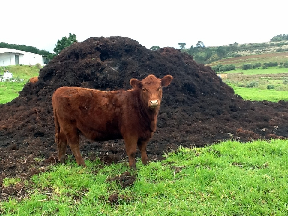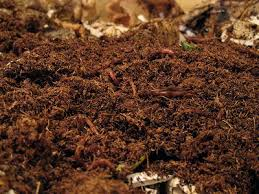Science > Biology > Management of Crop Production > Organic Fertilizers / Manures
Plants require nutrients for their normal growth. Soil supplies mineral nutrients to the crop. These nutrients must be in a form useable by the plants and in concentrations that allow optimum plant growth. Similarly, the soil nutrients must be properly balanced. Soil is a major source of nutrients needed by plants for growth. The three main nutrients are nitrogen (N), phosphorus (P) and potassium (K). Together they make up the trio known as NPK. Other important nutrients are calcium, magnesium, and sulfur. Plants also need small quantities of iron, manganese, zinc, copper, boron, and molybdenum, known as trace elements because only traces are needed by the plant. In certain areas, farmers grow crop after crop in the same field. The field is never left uncultivated or fallow. The continuous growing of crops makes the soil poorer in certain nutrients. This results in the fall of the yield of the crop. Therefore, farmers have to add manure or fertilizers to the fields to replenish the soil with nutrients. There are natural methods like field fallow, crop rotation, mixed cropping, and intercropping of soil nutrient management. However, natural methods of nutrient management of plant are not enough to maintain the fertility of soil and farmers are required to add manures and fertilizers from time to time.
Nutrient Management refers to the maintenance of soil fertility and of plant nutrient supply at an optimum level for sustaining the desired productivity through optimization of the benefits from all possible sources of organic, inorganic and biological components.
Manures:
Manures are the organic substances obtained from the decomposition of dead plants and animal wastes. Manures do not have a high content of nutrients. Instead, they give fertility to the soil by adding humus. The humus improves the soil’s physical properties, with better retention of moisture and more aeration. As manures are made entirely of organic materials they do not contribute to any form of pollution. They reduce waste on the farm, by decomposing waste materials to make manures.
Green Manure
Green manure is made from crops like legumes, ryegrass, fenugreek, etc. grown specifically to be ploughed into the soil while they are still green. It can be also done by covering the soil with green leaves (along with twigs) from plants grown in wastelands, field bunds, and forest. The plants that are grown for green manure known as green manure crops. The most common green manure crops are sunn hemp, dhaincha, and guar
Farm Yard Manure:
It is a mixture of cattle dung, urine, litter or bedding material, a portion of fodder not consumed by cattle and domestic wastes like ashes, etc. collected and dumped into a pit or a heap in the corner of the backyard. It is allowed to remain there and rot until it is taken out and applied to fields.

Animal Manure:
Animal manure consists of animal wastes.
Compost:
Well-rotted plant and the animal residue is called compost. Composting means rotting of plant and animal remains before applying in fields. The essential requirements of composting are air, moisture, optimum temperature and a small quantity of nitrogen. It is an activity of micro-organisms and some people recommend the addition of suitably prepared inoculums to introduce micro-organisms for decomposing the material.
The farmers dig a pit on the farm, where all organic waste material from the farm is collected. Then the pit is covered with a thick layer of mud to stop air and water from entering. The pit is left undisturbed for months. The microbes present in the soil start decomposing the waste to produce manure.
Vermiculture:
Vermiculture or vermicomposting is the process of garden composting using worms (earthworms, white worms, and red wigglers). Over time, all organic material naturally goes through the process of decomposition. Vermiculture is an accelerated process of decomposition (composting). The worms consume the decaying organic material and then flush it out of their system in what is referred to as ‘castings’ or ‘worm manure.’ The worm castings are nutrient-rich. The compost created by the worms is an excellent soil conditioner and all-natural fertilizer.

Advantages of Manures:
- They Provide humus to the soil which improves physical and chemical properties of soil.
- They restore soil texture.
- They improve water holding capacity of water hence reduces soil erosion and runoff.
- They make soil porous and aerated.
- They replenish all the nutrients in the soil.
- They reduce nitrate leaching from the soil
Disadvantages of Manures:
- They lack in minerals which are important for plant growth such as nitrogen, potash and phosphoric acid.
- They are not soluble in water and take more time for absorption by plants.
- Fresh manure has microbes in it that may be dangerous. Hence care should be taken in handling manures.
- Fresh manure must not be applied to edible crops. If manure touches foods, it can cause foodborne illnesses.
- Care should be taken that there is no runoff of the manure into sources of drinking water or food production areas.
- All vessels and equipment that have touched fresh manure should not touch produce that will be eaten raw.
- The amount of nitrogen in manure depends on the type of animal from which the waste is generated. If large amounts of fresh poultry manure are applied to already fertile soil, there may be enough nitrogen to damage the roots of young plants.
- There are high salt levels in the manure. High levels of salt can damage or kill plants.
- The odour of manure is highly disagreeable.
Compost Making:
Compost making is one of the most important agricultural practice that each and every farmer should do to improve the productivity of land naturally.
Material Required: Hoe, trowel, spade, dry matter(maize stalk, straws, dry grass, sugarcane leaves, dry beans stalk, and other farm wastes), green leaves (beans, shrubs, etc.),ashes, animal waste(cow dung, poultry droppings, shoats droppings, rabbit, goat, or pigs) and water.
- A trench of suitable dimensions about 4 m to 5 m long, 1.5 m to 2 m wide and 1 m to 1.5 m deep is dug.
- First layer: A well-mixed farm and animal refuse is spread as a lower layer in the trench of thickness about 30 cm. This layer is properly moistened by a slurry of cow dung or moistened soil.
- Second Layer: Then the second layer of well-mixed farm and animal refuse is spread above the previous layer in the trench up to height 30 cm 0r 45 cm above the ground.
- Third Layer: The top of the second layer is covered with a thin layer of earth.
After about 3 months, the whole mass of decomposed manure is taken out of the trench and laid on the ground in a conical heap for about 1 to 2 months. After this, the compost is ready for the use.
Previous Topic: Natural Methods of Plant Nutrition Management
Next Topic: Chemical Fertilizers